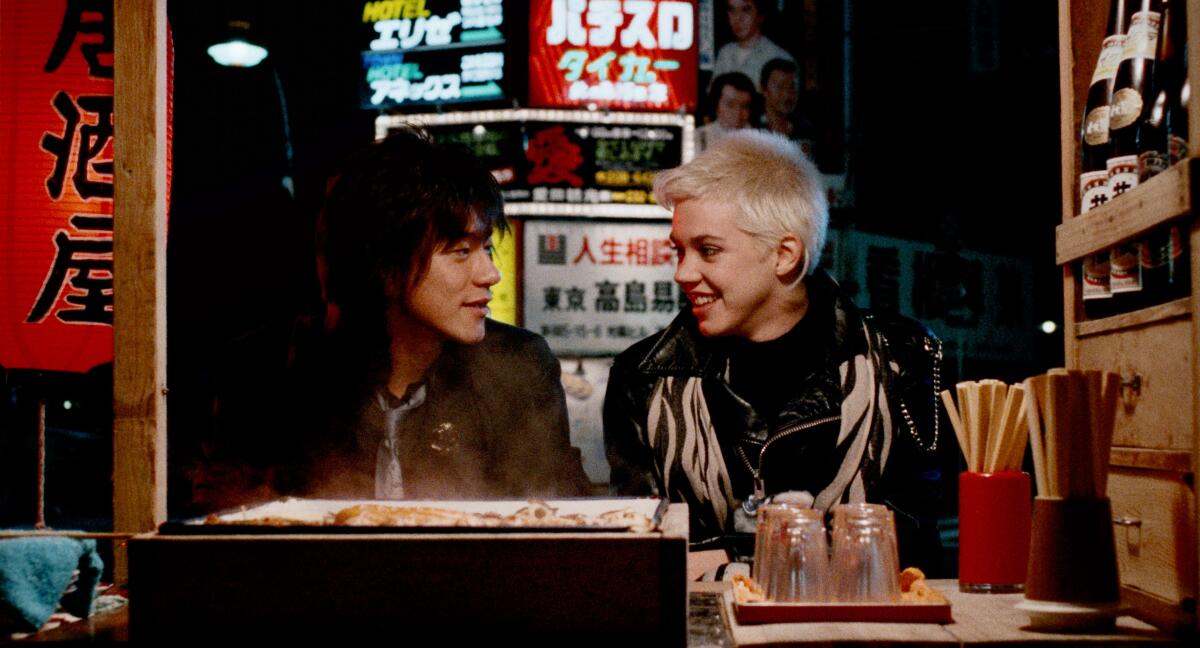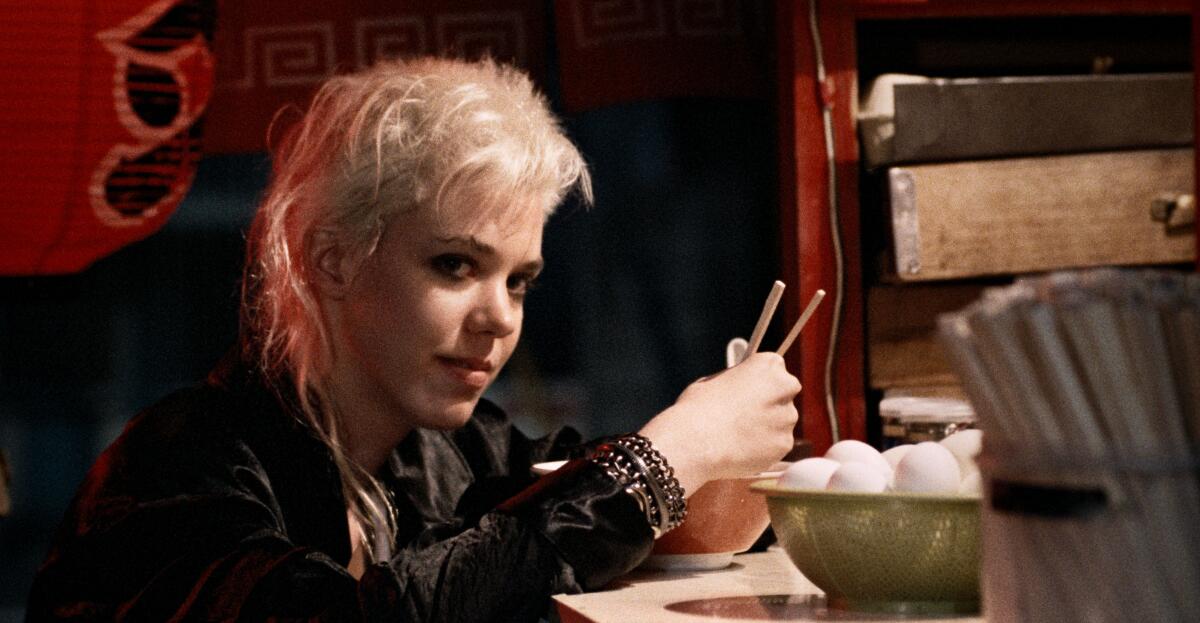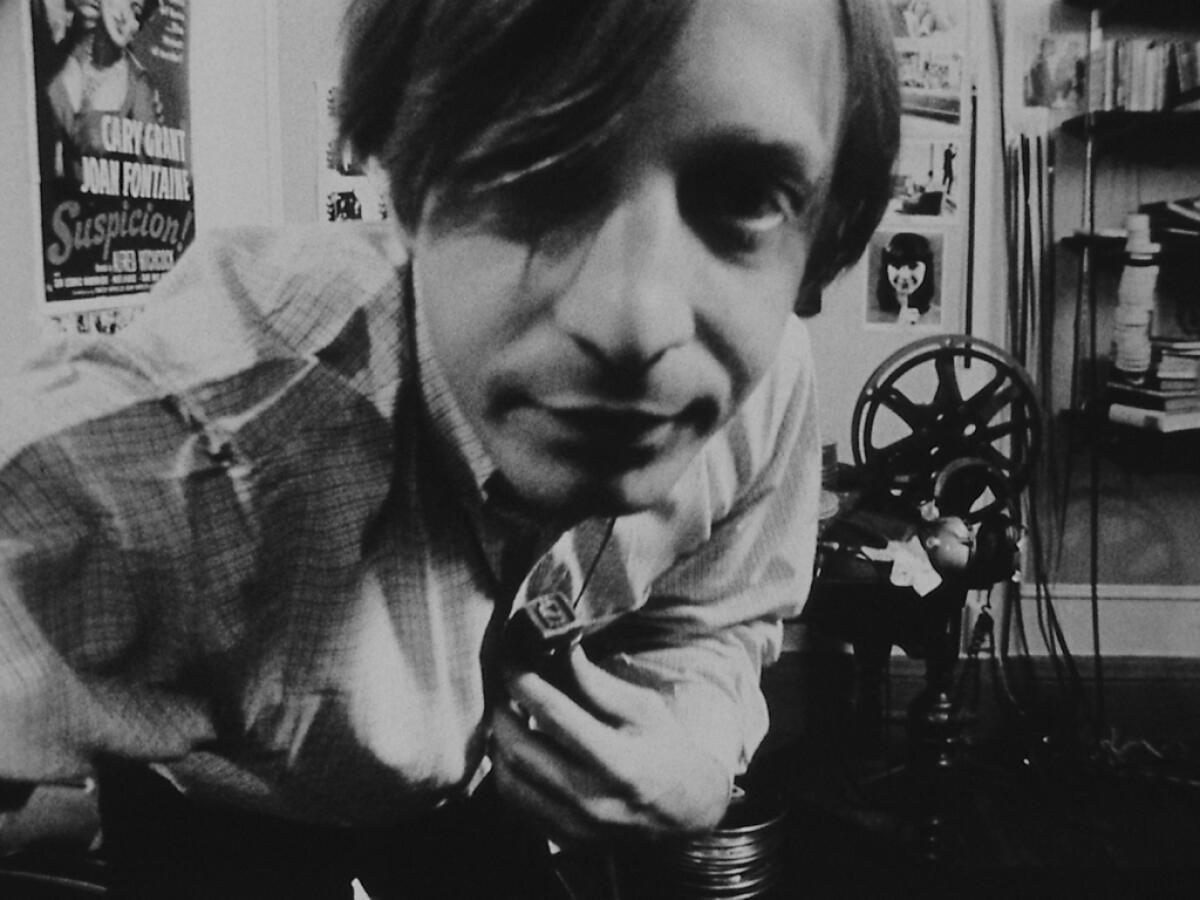Head to ’80s Japan with ‘Tokyo Pop,’ and more of the best to see in L.A. this week

- Share via
Hello! I’m Mark Olsen. Welcome to another edition of your regular field guide to a world of Only Good Movies.
Oscar-winning director William Friedkin, whose films included “The French Connection,” “The Exorcist,” “Sorcerer,” “Cruising” and “To Live and Die in L.A.,” died this week at age 87. His final film, “The Caine Mutiny Court-Martial” is scheduled to premiere in just a few weeks at the Venice Film Festival.
Friedkin’s films explored the darker reaches of the human condition, often showing people behaving badly. As Justin Chang put it in his tribute, “If Friedkin approached evil on a spiritual and intellectual plane, his genius was for channeling it viscerally and with sometimes brutal bluntness, for conjuring otherworldly menace through the sometimes steady, often-agitated movements of his camera, and for pushing his actors to unimaginable heights of terror and duress.” He called Friedkin, “a filmmaker who in his finest moments could turn the screen into a portal, opening his eyes and ours to the darkest of magic.”
I interviewed Friedkin at the Seattle International Film Festival in 2012, tagging along as he went to a Q&A after a screening of his adaptation of Tracy Letts’ “Killer Joe,” starring Matthew McConaughey. The film’s climactic scene is among the most intensely disturbing and upsetting things I have ever seen in a movie. As the malevolence played out during the movie, I was standing near Friedkin in the wings of the theater just off stage, where he was able to peer out unnoticed.
The way he smiled and giggled while watching the audience squirm and flinch and gasp was one of the most privileged moments of my career. To see the glee he got in shocking people was one thing, but the confident skill with which he essentially played the audience like an instrument, knowing exactly when and how to dial it up and pull it back, was genuinely astonishing. An unforgettable moment with an irreplaceable filmmaker.
And here are the best things going on at the movies in L.A. over the next week.
‘Tokyo Pop’ gets its due

The 1988 debut feature from director and co-writer Fran Rubel Kuzui, “Tokyo Pop” brims with an infectious energy and warmth, featuring a charming lead performance by Carrie Hamilton. She plays Wendy, an aspiring rock ’n’ roll singer who impulsively heads to Tokyo after receiving a postcard from a friend. Struggling to get her life together, she meets Hiro (Yutaka Tadokoro, who later performed under the name Diamond Yukai) and after joining his band they find fame together, though she comes to fear they are just a passing novelty act.
A new 4K restoration of the film opens Friday for a limited run at the American Cinematheque’s Los Feliz Theatre. Director Kuzui is scheduled to attend the first night’s screening for a Q&A.
“Tokyo Pop” takes the energy of early New York-based independent films from the likes of Susan Seidelman, Spike Lee and Jim Jarmusch and transports it to Tokyo. In her original Times review, Sheila Benson called the film “a shrewd, amiable cross-cultural romance full of talent at every level. … Its strengths are its pure, ingratiating sweetness, its insider’s view of cross-cultural romance and its eye-popping picture of a thoroughly Westernized Tokyo.”
“Tokyo Pop” was beset by multiple problems when it was initially released, as both its distributor and home video company were in the process of going bankrupt as the film was coming out, truncating how far it reached. In an interview this week, Kuzui estimated that with the new restoration, the film will now be seen by more people than when it first came out.
“The first thing that came to mind was the enormous talent and care that was put into this film, not only by me, but everybody who worked on it,” Kuzui said of the rerelease. “And it really never got to be seen. I’m so happy the work is getting shown, but mostly I’m so glad that Carrie Hamilton is having her moment in this film, that the film will stick around as a testament to her enormous talent.”
Hamilton, daughter of comedy legend Carol Burnett, had already been on the TV adaptation of “Fame” and a few other small roles when she was cast in the film. Though she would continue to act until her premature death in 2002 at the age of only 38, “Tokyo Pop” records her screen presence burning brightest.
“In the casting process, I met a lot of 22-year-old actresses and a lot of them didn’t want to go to the other side of the world for two or three months and make a movie,” said Kuzui. “They didn’t want to leave their boyfriend or they didn’t want to go someplace where they didn’t speak the language and the food was weird. And when I met Carrie, she never had any reservations at all. It was just sort of, ‘When do I leave? Where do I show up?’ ”
Following “Tokyo Pop,” Kuzui would direct the 1992 film “Buffy the Vampire Slayer.” And though Kuzui enigmatically told me, “I don’t talk about ‘Buffy’ much,” when actor Paul Reubens, who died recently at age 70, comes up she allowed, “I would gladly talk about that to the end of time, because Paul Reubens was one of the great people I’ve met in my lifetime.”
The title treatment and opening credits for “Tokyo Pop” were done by the artist Keith Haring, who is currently enjoying a renaissance of popularity amidst a retrospective exhibition in Los Angeles at the Broad Museum. Through their connections to the world of New York’s hip-hop scene — their distribution company brought Charlie Ahearn’s “Wild Style” to Japan — Kuzui and her husband knew Haring and helped him launch the Tokyo branch of his Pop Shop.
Haring’s collaboration on the credits was born of the same spontaneous energy as the film itself.
“That was certainly the ’80s. It was a time when everybody gave, and I could call Keith Haring and go, ‘Hey, I’m making a film,’ and he got on a plane and came to Tokyo just to encourage me and sit on the set for a week,” Kuzui said. “And then he said, ‘Hey, what are you going to do about opening credits?’ And I went, ‘I don’t know, I didn’t think about that yet.’ And he went, ‘How about if I do them?’ And I went, ‘Good idea.’
“And it was that kind of time where everybody just poured themselves into the creative process,” Kuzui said. “To me, ‘Tokyo Pop’ reminds me of a time when you didn’t question it. Everybody just went full-on in.”
Enjoying this newsletter? Consider subscribing to the Los Angeles Times
Your support helps us deliver the news that matters most. Become a subscriber.
The pre-TikTok energy of ‘David Holzman’s Diary’

Made for less than $3,000 over a handful of shooting days, 1967’s “David Holzman’s Diary” is among the most influential independent films ever made and is now part of the National Film Registry. The Mezzanine screening series will spotlight the film with a program on Sunday at 2220 Arts + Archives with director Jim McBride in attendance. With its exploration of the urge to self-document, the film has only gained more relevance in the era of Instagram and TikTok.
“David Holzman’s Diary” is a prototype of the mockumentary style, as it presents itself as a documentary made by a young man named David Holzman who has simply begun to film his everyday life. Yet he struggles to find anything of dramatic interest about himself — as his friend says, “Your life is not a very good script” — until eventually his equipment is stolen and the project is cut short. In fact, the movie is a fiction and David was played by L.M. Kit Carson, who would go on to be a co-writer of McBride’s remake of “Breathless” and Wim Wenders’ “Paris, Texas.”
Writing about the film in 1969, The Times’ Kevin Thomas called it “one of the great hoaxes of the cinema,” adding that it is “a good movie about life being like a bad movie.”
The evening will also feature the L.A. premiere of a restored 16mm print of McBride’s 1970 film, “My Girlfriend’s Wedding,” which is an actual documentary about a British roommate who had to marry someone else to maintain her visa.
Other points of interest
“Songs for Drella” Ed Lachman’s intimate 1990 concert film makes for another must-see Saturday evening as part of the Academy Museum’s summer series. The creative collaboration between Lou Reed and John Cale in the Velvet Underground was marked by tension and friction, making the tender reflections of this reunion to celebrate their mentor Andy Warhol all the more remarkable. “Songs for Drella” finds the duo performing their song cycle for the camera of Lachman, best known as a cinematographer (“Far from Heaven”), and the hour-long jewel-like film was recently restored when the original elements were rediscovered while Lachman was working with Todd Haynes on the documentary “The Velvet Underground.”
The movie is also available to stream on the Criterion Channel, but this rare chance to see it in a theater shouldn’t be missed. “Home of the Brave,” the 1986 multimedia piece conceived and directed by Laurie Anderson, partner to Reed in the later phase of his life, will also screen as part of the evening’s program.
Grindhouse marathon Get ready to get weird as Grindhouse Releasing is putting on a 12-hour movie marathon at the Lumiere Cinema at the Music Hall 3 on Saturday. Screenings will include “Vic,” “Pieces,” “The Beyond” and “Cannibal Holocaust,” all in 35mm, plus “I Drink Your Blood,” “An American Hippie in Israel” and “The Tough Ones” on DCP.
Free movies at Vidiots This weekend, Vidiots will be screening a series of movies for free hosted by the streaming service Pluto TV. The titles are “Spirit: Stallion of the Cimarron,” Joe Cornish’s “Attack the Block” starring John Boyega and Roger Moore’s final appearance as James Bond in “A View to a Kill” on Saturday, and Mark Waters’ 2003 version of “Freaky Friday,” Federico Fellini’s “La Dolce Vita” and Sylvester Stallone’s first outing as John Rambo in “First Blood” on Sunday. Tickets can be booked on Vidiot’s website.
“Medicine for Melancholy” and ”Diary of a Teenage Girl” As part of its ongoing series “San Francisco Plays Itself: Scenes From the Bay,” the UCLA Film and Television Archive will feature the smart double bill of Barry Jenkins’ “Medicine for Melancholy” and Marielle Heller’s “Diary of a Teenage Girl” on Sunday. Both are wonderful, fully formed debut features from filmmakers who have gone on to greater acclaim.
And not to step into the territory of our sibling newsletter Screen Gab, but one of my favorite movies of the year, Wes Anderson’s “Asteroid City,” just began streaming on Peacock and is also available on digital platforms and DVD/Blu-ray. If you haven’t seen it yet, it is tender and silly and rather haunting, and features a ridiculously packed cast including Jason Schwartzman, Scarlett Johansson and, in a single heartbreaking scene, Margot Robbie. Plus, Rupert Friend and Maya Hawke dancing to a tune called “Dear Alien” remains one of the most charming movie moments of the year.
Only good movies
Get the Indie Focus newsletter, Mark Olsen's weekly guide to the world of cinema.
You may occasionally receive promotional content from the Los Angeles Times.




